Brent Marchant's Blog, page 61
October 27, 2020
Tune in for The Cinema Scribe
Tune in for the latest Cinema Scribe segment on Bring Me 2 Life Radio today, Tuesday, October 27, at 2 pm ET, available by clicking here. And, if you don’t hear the show live, catch it later on demand.

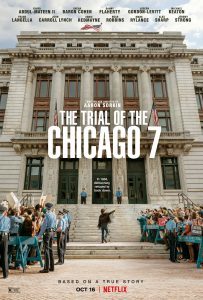
The post Tune in for The Cinema Scribe appeared first on Brent Marchant.
October 25, 2020
Wrapping Up the 2020 Chicago Film Festival
The Chicago International Film Festival recently completed its 2020 edition in its first-ever all-virtual format. With moviehouses just now beginning to reopen due to the COVID-19 pandemic, this alternative approach made it possible for the Festival to go forward, and it worked remarkably well, enabling viewers to screen a variety of films while remaining safe at home or in the comfort of their vehicles at its drive-in performances. As has been the case with other such events this year, this is a viable approach well worth considering for future programs, even without the threat of a pandemic. It makes it possible to offer the Festival’s films to a wider audience and provides flexible viewing conditions, benefits not necessarily available when presented exclusively in theatrical venues.

Because of this new format, I was able to screen a greater number of films than I have in the past. In total, I watched 18 feature offerings, which are reviewed below. Some of these offerings will subsequently be featured in expanded reviews on this site in the near future.
“Apples” (“Mila”) (Greece/Poland/Slovenia) (5/5) (*****)
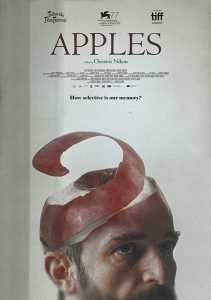
Director Christos Nikou is off to a fine start with his debut feature about an amnesia sufferer (Aris Servetalis) who struggles with trying to get his memory back while simultaneously attempting to get on with his life in case he can’t. This suspenseful, nuanced and engaging meditation on the nature of memory and the selectivity of its retention will keep viewers guessing from start to finish, all the while serving up heaping helpings of wry humor and cleverly dangling clues before our eyes that may or may not prove integral to solving the mystery of this intriguing conundrum. The film mirrors the eccentricity of directors like Yorgos Lanthimos and Charlie Kaufman, presents a puzzle not unlike that found in Christopher Nolan’s “Memento” (2000), and successfully incorporates the kind of deadpan laughs characteristic of releases like Hal Ashby’s “Being There” (1979). The film’s inventive, tautly assembled script, written by Nikou and Stavros Raptis, deservedly captured the Festival’s Silver Hugo Award for best screenplay. Indeed, if this is what Nikou has to offer in his first major outing, I can’t wait to see what he comes up with next.
“The Columnist” (“De kuthoer”) (Netherlands) (5/5) (*****)

In an age when anyone seems to feel he or she can say anything about anyone on social media without retribution, it’s easy to understand how someone aggrieved might lose it and want to fight back. So it is for the columnist of a popular Dutch periodical (Katja Herbers) who comes under attack from all directions in an assault of unfair (and patently untrue) cyber-bullying – that is, until she decides to fight back using more than just her words. This expertly directed, superbly well acted macabre comedy packs quite a laugh- and horror-filled punch, skillfully knowing when to push the tastefulness envelope and when to pull it back, all tinged with just the right amount of camp and social commentary. There is a slight tendency toward heavy-handedness in a few spots, especially near the end, but director Ivo van Aart’s skillful hand keeps it from getting out of control and turning into a lecture. A real Dutch treat that shouldn’t be missed.
“Kubrick by Kubrick” (France/Poland) (5/5) (*****)
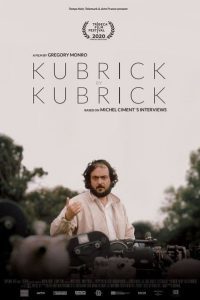
This positively superb documentary about the life and career of legendary director Stanley Kubrick not only does justice to the life of the artist, but also does justice to itself as a tremendous piece of filmmaking. Based on rare audio interviews with the auteur by writer Michel Ciment, director Gregory Monro’s homage to this iconic talent features a wealth of well-chosen clips from most of Kubrick’s pictures (“Paths of Glory” (1957), “Spartacus” (1960), “Dr. Strangelove” (1964), “2001: A Space Odyssey” (1968), “A Clockwork Orange” (1971), “Barry Lyndon” (1975), “The Shining” (1980), “Full Metal Jacket” (1987), “Eyes Wide Shut” (1999)). It also includes incisive archival interview footage with those who worked with him, including actors Jack Nicholson, Peter Sellers, Tom Cruise, Nicole Kidman, Sterling Hayden, Malcolm McDowell, Shelley Duvall and R. Lee Ermey, as well as behind-the-scenes crew members and noted film critics. The documentary’s impeccable editing and inventive production design link its various segments in ways that pay a fitting tribute to its subject’s work, reverently echoing Kubrick’s style and reinforcing the themes and perspectives that made his films so original and unforgettable. For fans of the filmmaker, this is absolute must-see material.
“New Order” (“Nuevo orden”) (Mexico/France) (5/5) (*****)
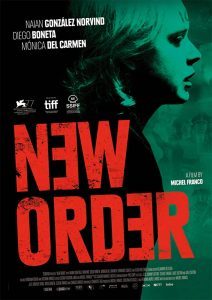
In a modern-day version of Mexico, all hell breaks loose when class-based and racially driven riots erupt in the streets, pitting the nation’s sharply divided haves and have-nots against one another in violent urban struggles. While the lines of the warring factions are clearly drawn (and, some might say, perhaps a little too stereotypically at that), the film nevertheless effectively captures the searing frustration felt by the underprivileged, not only in Mexico but globally. Director Michel Franco’s latest will probably be a difficult watch for most viewers, as its frightening narrative doesn’t hold much back (though, thankfully, it successfully avoids the trap of becoming gratuitous, even if by only a slim margin). The message here is one not to be ignored, especially in the wake of events seen across the U.S. in the summer of 2020. We can only hope that this is not a sign of things to come, both on the screen and in the streets.
“And Tomorrow the Entire World” (“Und Morgen die ganze Welt”) (Germany/France) (4/5) (****)

When a first-year law student (Mala Emde) joins an Antifa commune in Berlin to combat rising right-wing hate groups in Germany, her commitment gets tested, especially when she begins falling for the organization’s extremist leader (Noah Saavedra). Is she fighting for a cause, supporting a romantic interest or some of both? Those are the issues she wrestles with as she gets more deeply involved than she probably ever thought she would be. While a bit predictable and a tad meandering at times, director Julia von Heinz’s latest nevertheless capably explores questions of involvement, both socially and romantically, as well as the naïvete of youth and the difficulty of hard choices in the face of inexperience. The picture’s excellent ensemble earned the film the Festival’s Silver Hugo Award for best cast, a well-deserved honor. The film’s strengths aside, however, this may be a hard watch for some viewers, but, like fellow Festival offering “New Order” (see above), its relevancy in today’s sociopolitical climate couldn’t be more timely.
“Preparations to Be Together for an Unknown Period of Time” (“Felk ész ül és meghat ározatlan ideig tart ó egy üttl étre”) (Hungary) (4/5) (****)
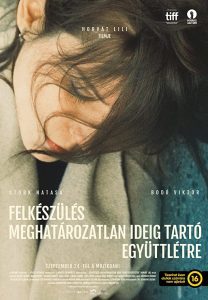
Director Lili Horvát’s second feature presents an ominous, atmospheric tale of romantic obsession and the struggle to grasp the true state of one’s reality, all wrapped up in a psychological thriller. The film’s edge-of-the-seat quality is successfully sustained for much of its run, but, regrettably, it winds up feeling somewhat incomplete and unfulfilling by picture’s end. Natasa Stork’s fine lead performance as a troubled neurosurgeon, the picture’s exquisite cinematography and its clever editing will definitely keep viewers guessing for much of the film, but whatever intrigue capital the director has amassed by the final act is somewhat squandered on a less-than-satisfying outcome. Still, for her efforts, Horvát received the Festival’s Gold Hugo Award in its New Directors Competition, but, for my money, this Hungarian offering comes close but doesn’t quite hit the mark as squarely as it could have.
“The Prophet and the Space Aliens” (Israel/Austria) (4/5) (****)
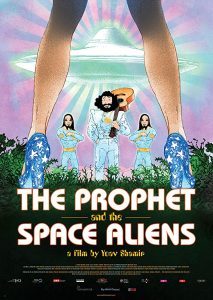
Director Yoav Shamir’s entertaining documentary about self-proclaimed UFO Prophet Rael and his extraterrestrial-based religion tactfully walks a fine line between journalistic objectivity and tongue-in-cheek satire about the life of a former aspiring pop star-turned-race car driver-turned-high priest of an emerging new belief system. In telling this story, Shamir is careful not to be a softballing spokesperson for the cause nor a pitbull reporter seeking to cynically tear it to shreds, presenting a fair and balanced examination of his subject and his movement, posing probing questions when needed but ultimately letting viewers make up their own minds. If nothing else, his interviews with many of Rael’s followers reveal a loving and devoted band of admirers who firmly believe in the positive and uplifting messages of the faith and how those principles have brought them happiness, freedom and fulfillment in ways that they don’t believe would have attainable through other means. Thought-provoking and soul-searching in nature, the film is a fun yet respectful look at a movement that may be a little out of the ordinary and most definitely out of this world.
“ ʼTil Kingdom Come” (“Ad Sof HaOlam”) (Israel/U.K./Norway) (4/5) (****)

This simmering documentary about the unlikely bond between American Evangelicals and Israeli conservatives to manipulate policies aimed at fulfilling Biblical prophecy grows scarier with each passing minute. With an agenda of expediency and literal adherence to scripture wrapped around a fundamentally hypocritical core, the undertakings of this potentially calamitous alliance should make everyone shudder. Thankfully, director Maya Zinshtein’s incisive offering makes that abundantly clear. The film could have benefitted from a little more back story and the input of some additional experts, given its scant 76-minute runtime. However, what material is there is rock solid and hard-hitting, presented without judgment and letting the content speak for itself – which it does in volumes.
“Twilight’s Kiss” (“Suk Suk”) (Hong Kong) (4/5) (****)
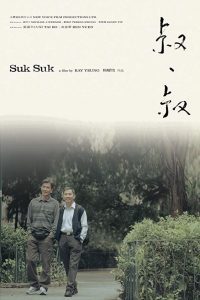
This sensitive gay romance between two seniors (Tai-Bo, Ben Yuen) who have denied their feelings about themselves for decades but are now willing to consider a future together touches on a number of issues pertinent to anyone who is aging but especially to those seeking to forge long-denied same-sex relationships. Despite a few story threads that aren’t explored as fully as they might have been and a somewhat sappy love song soundtrack, the film brims with heartfelt emotion and thoughtfully examines questions crucial to gay seniors, such as same-sex nursing home care, relationships in the face of impending mortality and the acceptance of gay parents by adult children. Director Ray Yeung’s third feature satisfies and even leaves viewers longing for more (something he may want to consider incorporating in future projects).
“Becoming Mona” (“Kom hier dat ik u kus”) (Netherlands/Belgium) (3/5) (***)
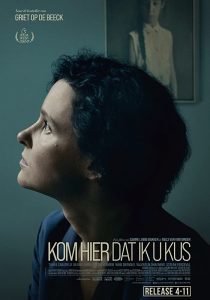
This honest, realistic domestic drama examines the dynamics of a family in crisis and an eldest daughter (Tanya Zabarylo) who always tries to do the right thing whenever dysfunction rears its ugly head, even when it comes at a painful emotional cost to her. Though well-acted and capably paced, the story itself is somewhat lacking in originality, not charting any particularly new territory and presenting dilemmas and scenarios we’ve all seen before. While this effort from directors Sabine Lubbe Bakker and Niels van Koevorden may be moving, it’s not especially innovative, leaving viewers wanting something more groundbreaking, despite a relatively solid narrative foundation. “Becoming Mona” certainly passes the time, but it doesn’t leave a particularly indelible mark.
“Dear Comrades!” (“Dorogie tovarishchi!”) (Russia) (3/5) (***)

This re-creation of a 1962 anti-Soviet workers’ strike at an electromotive manufacturing plant in Novocherkassk, Russia brings this obscure but violent historic event to life on a human scale in legendary director Andrey Konchalovskiy’s latest. Gorgeously shot in black and white, the film focuses on the experience of a devout party advocate (Yuliya Vysotskaya) who becomes staunchly disillusioned when the fallout from the event affects her personally and profoundly. Regrettably, the story is so heavy on detail that it becomes talky and tedious at times, especially in its depiction of discussions among Party, KGB and military officials. The fine lead performances of Vysotskaya and Vladislav Komarov help to cover for this shortcoming somewhat, but a judicious degree of snipping to accelerate the pacing would have helped make a good film a great one. For his efforts, though, Konchalovskiy won the Festival’s Silver Hugo Award for best director.
“Gaza Mon Amour” (Palestine/France/Germany/Portugal/Qatar) (3/5) (***)

This touching, whimsical yet tentative love story about a 60-year-old financially strapped Palestinian fisherman (Salim Dau) who falls for a retiring seamstress (Hiam Abbass) plays like an ongoing game of cat and mouse. But, when he unexpectedly “catches” a prized antique Greek statue in his nets, his fortunes take a turn for the better, with a few detours along the way (not to mention the many ongoing challenges of everyday life in Gaza). While the Nasser Brothers’ love-conquers-all tale serves up its share of charm and wit against an unlikely backdrop, a few more laughs certainly would have helped bolster this otherwise-delightful tale. Think of this as a sort of modern-day “Moonstruck” (1987) in the Middle East, and you’ve got a rough idea what this one is all about.
“Mama Gloria” (U.S.) (3/5) (***)

Legendary Black trans female activist Gloria Allen (a.k.a. Mama Gloria) has led quite a remarkable life, as chronicled in this new documentary about her storied 73 years. This Chicago icon of the LGBTQ community has experienced both heartwarming and heartbreaking times in her life, not only in her journey of self-discovery and her various relationships and friendships, but also in her efforts to earn recognition and respect for the trans community, especially at-risk trans women of color. She details the joys of launching her charm school for trans women (and the experience of having had that story made into a play), as well as the anguish of the beatings that she and her peers endured at the hands of the intolerant. While director Luchina Fisher’s documentary feature debut is, on balance, well constructed, it nevertheless could have used better editing in spots, particularly in smoothing out transitions, deleting some extraneous material and expanding on other elements that deserve more attention. Still, Mama Gloria’s inspiring story is one for anybody who feels as if they’re on the outside looking in – and looking to change that for themselves.
“Sweat” (Sweden/Poland) (3/5) (***)
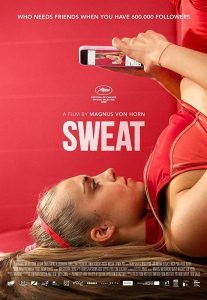
What makes us happy? And are those who are seemingly happy all the time truly the happiest? Those are the questions posed by “Sweat,” the story of a popular online fitness instructor (Magdalena Kolesnik) who seems to have it all together, but does she really? In this age of omnipresent social media, that’s a critical question we all need to ask ourselves, and the film makes a valiant attempt at doing so, but it takes far too long to make its point, taking viewers through considerable seemingly irrelevant flotsam on its way there. While director Magnus von Horn’s second feature deservedly earned the Festival’s Silver Hugo Award for best art direction, it’s rather hard to fathom that the film also captured the Gold Hugo Award as the Festival’s best feature (it’s simply not that good). Indeed, for a better cinematic exploration of the film’s central message, watch the vastly underrated American offering “Ingrid Goes West” (2017) instead.
“Memory House” (“Casa de antiguidades”) (Brazil/France) (2/5) (**)
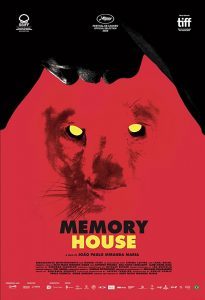
Ambitious, haunting and hypnotic but ultimately wildly unfocused, this debut feature from director João Paulo Miranda Maria tries to cover too much ground and ends up doing more to baffle viewers than to enlighten them. In this symbolic and surreal examination of the de facto state of colonialism existing in contemporary southern Brazil, the narrative attempts to explore the ethnic, sociopolitical and inequality issues affecting the region’s minority population as told through the eyes of a Black dairy worker (Antonio Pitanga). Ethereal imagery and inventive cinematography get the picture off to a promising start, but the film loses its way as it goes on, pursuing one unresolved tangent after another and eventually going completely off the rails in the final act. While it’s commendable that the filmmaker doesn’t spoon-feed his audience, he nevertheless seems to expect them to possess an intimate knowledge of Brazilian politics and culture to grasp his message. That may be fine for a screening to a regional viewership, but, for an international film festival (or mainstream distribution, if one should result), that’s expecting a lot from the audience just to be able to understand what he’s trying to say. In spite of these problems, however, the film somehow managed to capture the Roger Ebert Award in the Festival’s New Directors Competition.
“Careless Crime” (“Jenayat-e bi deghat”) (Iran) (1/5) (*)
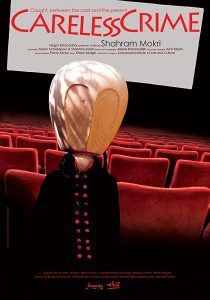
Handily one of the most audaciously pretentious pieces of cinematic crap I have seen in ages. “Based” on a tragic act of arson in an Iranian moviehouse shortly before the 1979 overthrow of the Shah – a premeditated terrorist attack on so-called decadent Western cultural influences – “Careless Crime” echoes that story and sentiment in a modern-day theater presenting a film by the same name. That movie-within-a-movie, in turn, echoes the lives of present-day theater owners and patrons attending a screening that has been targeted for attack by a quartet of contemporary arsonists, while also giving nods to the anniversary of the 1979 moviehouse incident, creating a multi-layered, folded-over time loop involving the integration of the three primary story threads. I found director Shahram Mokri’s overly glib, too-clever-for-its-own-good offering to be stunningly baffling, frequently pointless, and, frankly, lacking in respect for the original tragedy. I might have cut this film more slack if it weren’t directly referencing an actual event in which nearly 500 people lost their lives, but a project that so cavalierly springboards off of a tragedy like that just leaves a bad taste in my mouth, as I would think it should for most viewers (that is, those who’d be willing to waste 2:15 of their lives watching this celluloid mess). Add to that some rather cheesy production values and a desperate need for excessive editing, and you’ve got something that’s really not worth your while, despite its inexplicable capture of the Festival’s Silver Hugo Jury Prize Award.
“Sleep” (“Schlaf”) (Germany) (1/5) (*)
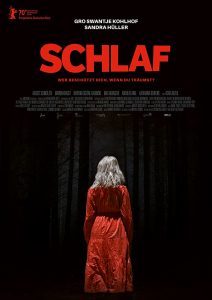
What starts out as an ambitious suspense tale turns tedious not far into the story as it introduces so many different unresolved tangents that it becomes difficult to decipher and even more of a chore to care about. With references to lucid dreaming, German folklore, and past and present right-wing German politics, director Michael Venus’s debut feature becomes so convoluted that it leans laughable when it’s not being a big bore (or “boar,” given its repetitive woodland animal imagery). What’s most regrettable, though, is that this supposed horror thriller fails to live up to its billing by coming up short on its primary mission – being scary, something it most definitely is not. Sadly, when watching a film becomes too much work to enjoy the experience, it’s really not worth the time or effort, and so it is with this big snooze.
“Summer of 85” (“ Ét é 85”) (France/Belgium) (1/5) (*)
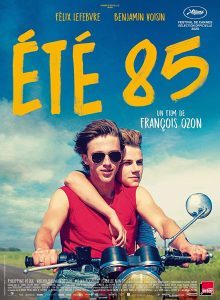
If I could give this a score of less than 1, I would. Writer-director François Ozon’s utterly preposterous, vanilla-encrusted “forbidden gay romance” tale is so unbelievably dated and clichéd that it’s unfathomable anyone would have wanted to back this project. With a narrative that plays like so many “homosexual dramas” of the ʼ60s and ʼ70s in which something bad inevitably happens to someone just by virtue of being gay, “Summer of 85” is a trite throwback to those cautionary tales of yore (and, even at that, it’s almost totally lacking in the suspense that made some of those stunningly judgmental, overly prejudicial releases at least somewhat entertaining in their own excessively intolerant way). There is something of a modest camp factor present here, but not nearly enough to make this the parody of those old melodramas that it could have been. Skip this one at all costs.
Copyright © 2020, by Brent Marchant. All rights reserved.
The post Wrapping Up the 2020 Chicago Film Festival appeared first on Brent Marchant.
October 19, 2020
‘Chicago 7’ fights for the pursuit of justice
“The Trial of the Chicago 7” (2020). Cast: Eddie Redmayne, Sacha Baron Cohen, Joseph Gordon-Levitt, Michael Keaton, Frank Langella, Mark Rylance, Alex Sharp, Jeremy Strong, John Carroll Lynch, Yahya Abdul Mateen II, Kelvin Harrison Jr., Ben Shenkman, J.C. MacKenzie, Danny Flaherty, Noah Robbins, John Doman, Caitlin FitzGerald, Alice Kremelberg, Wayne Duvall, Steve Routman, Mike Geraghty. Director: Aaron Sorkin. Screenplay: Aaron Sorkin. Web site. Trailer.
We all want justice. We all want to see it served. But does it always turn out that way? Seeking it requires diligence and a concerted effort to make sure that what needs to be revealed indeed is. Nevertheless, even with the best of intentions and a noble approach, it’s possible that the process can become compromised, making the need to fight for the truth even more important, a prospect explored in the gripping new fact-based drama, “The Trial of the Chicago 7.”
The summer of 1968 – like much of the decade that preceded it – was a time of turmoil in the U.S. The country was embroiled in an exceedingly unpopular war, riots plagued the streets of American cities, the assassinations of Martin Luther King Jr. and Robert Kennedy shocked the nation, and angry, sometimes violent protests on a variety of social issues were breaking out seemingly everywhere. And, with a critical election coming up, the tension level swelled, especially as reformers and establishmentarians clashed both literally and ideologically. But, for everything that had happened thus far, the most dramatic outburst was yet to come during the Democratic National Convention in Chicago. The Windy City was about to become a flash point between protestors seeking change and an old guard determined to preserve order and, if possible, do whatever it could to squelch dissent, even if presented peacefully.
In the run-up to the convention, a number of protest groups began organizing their events. They did so in an orderly fashion, too, even going through proper channels to obtain permits for their rallies and marches. However, when the city learned who these applicants were, officials systematically turned down virtually every request submitted by anyone with leftist or anti-establishment leanings (most notably by David Stahl (Steve Routman), the city bureaucrat charged with reviewing and issuing permits, who operated under express orders from Mayor Richard Daley to refuse the requests of any “anti-patriotic” groups).
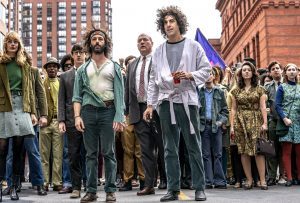
Four of the eventual Chicago 7 defendants (from left, Rennie Davis (Alex Sharp), Jerry Rubin (Jeremy Strong), David Dellinger (John Carroll Lynch), Abbie Hoffman (Sacha Baron Cohen)), lead a March through the Windy City during the 1968 Democratic National Convention in writer-director Aaron Sorkin’s “The Trial of the Chicago 7.” Photo by Niko Tavernise, © 2020, courtesy of Netflix.
Needless to say, such blatant prejudicial treatment did not set well with the protestors, who vowed to move ahead with their plans, all the while insisting on remaining peaceful in their approach. Various groups began making their own arrangements, including the Students for a Democratic Society (SDS) under the leadership of Tom Hayden (Eddie Redmayne) and Rennie Davis (Alex Sharp); the Youth International Party (Yippies) led by Abbie Hoffman (Sacha Baron Cohen) and Jerry Rubin (Jeremy Strong); and the National Mobilization Committee to End the War in Vietnam (the MOBE), whose efforts were organized by David Dellinger (John Carroll Lynch) with the assistance of Lee Weiner (Noah Robbins) and John Froines (Danny Flaherty). Black Panther Party leader Bobby Seale (Yahya Abdul Mateen II) also planned to make an appearance to give a speech.
However, despite intentions to keep matters nonviolent, that’s not how events played out. As the convention began and protestors assembled, circumstances took a violent turn when demonstrators found themselves involved in skirmishes with Chicago police. To make matters worse, the whole spectacle played out uncut on national TV for the entire nation to see. But, as tragic and embarrassing as all this was for both the Windy City and the nation as a whole, the situation was about to become even more distressing and humiliating.
With the election of Republican candidate Richard Nixon as President in November 1968, the nation’s political and social direction took a dramatic turn to the right, and Nixon was only too happy to oblige those leanings. Together with newly appointed Attorney General John Mitchell (John Doman), the Nixon Administration wanted to make an example of the protestors. As grand jury investigations into the incidents of August 1968 unfolded, the new Chief Executive and his minions clandestinely encouraged the orchestration of what was essentially a show trial aimed at bringing down the demonstrators (and, it was hoped, to break the backs of their movements through successful court decisions against them). In the wake of these formal inquiries, charges were filed against Hayden, Davis, Hoffman, Rubin, Dellinger, Weiner, Froines and Seale on the grounds of violating the federal Rap Brown Law for conspiracy to cross state lines to incite riots, despite the fact that most of them didn’t know one another until they met in Chicago. Given that, one naturally might ask, “How could that constitute a conspiracy?”

When faced with crowds of demonstrators in Chicago’s Grant Park, the city’s police mobilize to keep order, as seen in “The Trial of the Chicago 7,” now available for online streaming. Photo by Niko Tavernise, © 2020, courtesy of Netflix.
When the trial began in September 1969, the prosecution was represented by U.S. Attorneys Thomas Foran (J.C. MacKenzie) and Richard Schultz (Joseph Gordon-Levitt). The majority of the defendants were counseled by attorneys William Kunstler (Mark Rylance) and Leonard Weinglass (Ben Shenkman) of the Center for Constitutional Rights. Seale’s lawyer, however, was not in attendance due to health issues, leaving him without representation, a fact that he repeatedly raised before the court but was summarily ignored. These were among the many unfounded and inexplicable rulings handed down in the case by presiding Judge Julius Hoffman (Frank Langella), who was clearly biased against the defendants, nearly always turning down their requests while gladly approving the motions of the prosecution.
It wasn’t long before it became obvious that the fix was in, especially since Schultz and Foran were operating under explicit orders from Mitchell to get the convictions the government wanted, no matter what it took. And, because of that, the courtroom quickly turned into an unmitigated circus. For example, Seale’s outbursts over the denial of his lack of representation motions frequently turned boisterous, prompting his supporters, such as fellow Panther Fred Hampton (Kelvin Harrison Jr.) and others, to loudly begin chanting claims of judicial discrimination. (It subsequently became more than a little suspicious when Hampton turned up dead shortly thereafter.) Meanwhile, defendants Hoffman and Rubin routinely mocked the procedures and decorum of the court, calling the proceedings a political trial and routinely shouting out profanities. Then there were the numerous charges of contempt that the judge issued against the defendants and their counsel, distributed so freely that it was as if he were handing out Halloween candy. And all of this is but a mere sampling of the unbelievable events that went on.
The key issue in the case, of course, was, “Who started the violence that broke out during the protests?” In testimony offered by undercover operatives (Caitlin FitzGerald, Wayne Duvall, Mike Geraghty), the defendants were undeniably pegged as being at fault. Yet, given the peaceful intentions of the protestors, it seemed unlikely that they would have strayed so far afield from their plans, despite the treatment they received at the hands of the police.

Tom Hayden (Eddie Redmayne) of the Students for a Democratic Society addresses a crowd of protestors in director Aaron Sorkin’s “The Trial of the Chicago 7.” Photo by Niko Tavernise, © 2020, courtesy of Netflix.
So who threw the first punch? That’s what the proceedings were supposed to find out. But, considering the court’s blatantly partial handling of the defendants, it became increasingly clear they would never get a fair trial or an honest judgment – unless, of course, defendants’ counsel could present a witness capable of blowing the prosecution’s allegations out of the water. And, as the protracted trial went on and on, Kunstler and Weinglass just may have found such a witness in former Attorney General Ramsey Clark (Michael Keaton), who looked into the case before leaving office and prior to Mitchell’s appointment by Nixon as his replacement. Clark’s contention that the inquiry found nothing to support pressing charges against the defendants could completely turn the tide of the trial – provided he would be allowed to testify.
Such was the state of the trial as it headed toward its conclusion in February 1970. What would be the result? Would justice be served? Or would it be denied in favor of a politically expedient outcome? That’s what a nation on edge was waiting to find out – and what might come of it as the country moved toward an uncertain future.
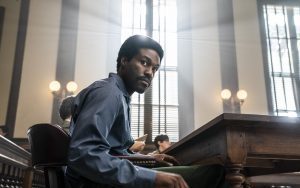
Black Panther Party leader Bobby Seale (Yahya Abdul Mateen II), a defendant without counsel during the trial of the “Chicago 8,” fights for recognition of his representation status in “The Trial of the Chicago 7.” Photo by Niko Tavernise, © 2020, courtesy of Netflix.
To achieve justice, we must rely on a process that is eminently authentic, faithful to the truth, with a sense of veracity that we can all believe in. But what happens when efforts are made to deliberately manipulate that truth, to bend it in such a way to attain a certain agenda-driven outcome? Can we guarantee that justice will be served under such circumstances, especially when a jury is expected to rule based on evidence that may be incomplete, slanted or purposely distorted? And, if not, what is the likelihood that any resulting miscarriage can be rectified at some point? Those questions were put on trial during this historic proceeding, as this film so clearly shows, warts and all.
In the end, those deciding the fate of the defendants had to rule based on beliefs that went beyond a reasonable doubt. And those beliefs, in turn, had to be based on the evidence presented in court, even if it didn’t represent the full story of what actually happened. So, in light of that, should it come as any surprise that the outcome was an outgrowth of those qualifying conditions? That’s how matters generally turn out when it comes to the conscious creation process, the philosophy that maintains we draw upon the power of our thoughts, beliefs and intents in shaping the reality we experience – including things like courtroom decisions.
Based on how matters played out during the trial, it became apparent that officialdom sought to game the system to arrive at its desired result, even if that meant floating inauthentic information in court. That included not only manipulating the testimony of its own witnesses, but also looking for ways to intentionally exclude information that would undermine its contentions, especially damaging and compelling arguments put forth by the defendants. Presenting “the facts” in that way could only serve to misrepresent the evidence and, in turn, the beliefs that jurors would make of it in handing down their verdict.

Judge Julius Hoffman (Frank Langella) presides over a chaotic courtroom in “The Trial of the Chicago 7,” now available for online streaming. Photo by Niko Tavernise, courtesy of Paramount Pictures.
And, if twisting the evidence by itself was not sufficient, then other tactics were employed to help sway the outcome. These measures included attempted jury tampering to eliminate panel members who appeared sympathetic to the defendants’ cause. But these maneuverings paled in comparison to other ploys, such as efforts aimed at excluding the testimony of former Attorney General Clark. However, perhaps the most egregious example of such malfeasance came when Judge Hoffman grew so impatient with Seale’s repeated motions regarding his representation status that he had the defendant bound and gagged in the courtroom, an action that shocked the public and ultimately led to the declaration of a mistrial in this defendant’s case (thereby reducing the number of defendants down to the now-familiar “Chicago 7”).
Initiatives such as these are prime examples of un-conscious creation at work, an approach to the philosophy based on achieving a desired result at any cost, no matter what fallout might be involved. In this case, the actions of the judge and prosecution were so deliberately hell-bent at realizing their sought-after outcome that they engaged in the practice of pushing the Universe, an intentional attempt at coercing our conscious creation collaborator into giving us what we want that we’ll do virtually anything to reach that result. While those pursuing such a course may have convinced themselves that this is a perfectly legitimate approach, they often lose sight of the fact that it can lead to all manner of unintended side effects and distorted outcomes. That was certainly the case here, for example, as evidenced by the declaration of Seale’s mistrial.
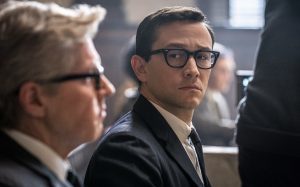
Attorneys Thomas Foran (J.C. MacKenzie, left) and Richard Schultz (Joseph Gordon-Levitt, right) present the government’s prosecutorial case in director Aaron Sorkin’s “The Trial of the Chicago 7.” Photo by Niko Tavernise, © 2020, courtesy of Netflix.
Despite the many challenges and obstacles that the defendants faced during their trial, they kept fighting, because they believed they were right. They were convinced that they had the truth on their side, if only they could figure out how to successfully bring it to the surface. But, perhaps more importantly, there was more at stake than their own destinies, including the right to free speech and the right to a fair trial, both of which were coming under attack by forces seeking to curtail or eliminate them for everyone, not just those in the Chicago courtroom. Their efforts to champion these civil liberties were part of their value fulfillment, the conscious creation concept associated with being our best, truest selves to use our beliefs for the betterment of ourselves and those around us. It’s a message that was certainly important at the time, but it’s perhaps even more crucial now than ever before in light of the current sociopolitical climate. And, to that end, the timing of this film’s release is more than a little serendipitous, a notion that should not be lost on any of us.
While this superb docudrama takes some liberties with the facts of this landmark court case, writer-director Aaron Sorkin’s latest offering gets much of it right, with what it invents making for some damned good theater. Admittedly, the picture is a tad talky in the first half hour, but that shortcoming is covered well by the film’s stellar cast, including Cohen, Rylance, Redmayne, Strong, Lynch, Langella, Gordon-Levitt and Keaton. And, once the picture hits its stride, it’s a compelling watch from that point forward, especially in the flashback sequences that re-create the events that were the subject of the trial. This is one we should all see – and make a point of embracing its message. The film had a limited theatrical run and is now available for streaming on Netflix.

Legend has it that, upon exiting Independence Hall after the Constitutional Convention, American political icon Benjamin Franklin was reported to have described the newly formed government as “A republic, if you can keep it.” Observers might find that qualification somewhat unsettling – and with good reason. As the trial of the Chicago 7 illustrates, it can be all too easily lost, a warning that should be borne in mind today as we parallel those conditions of five decades ago. It’s a caution very much in line with Mark Twain’s observation that “history doesn’t repeat itself, but it often rhymes.” And, considering the stanzas involved in this particular verse, that’s poetry we can all do without.
Copyright © 2020, by Brent Marchant. All rights reserved.
The post ‘Chicago 7’ fights for the pursuit of justice appeared first on Brent Marchant.
October 13, 2020
This Week in Movies with Meaning
Reviews of “Blackbird,” “House of Cardin” and “Cicada,” as well as a film festival wrap-up, are all in the latest Movies with Meaning post on the web site of The Good Media Network, available by clicking here.
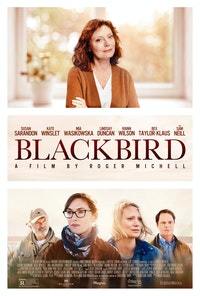
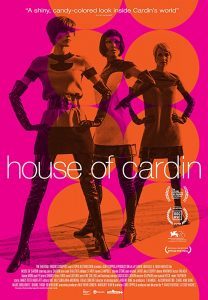



The post This Week in Movies with Meaning appeared first on Brent Marchant.
Check out The Cinema Scribe
Tune in for the latest Cinema Scribe segment on Bring Me 2 Life Radio today, Tuesday, October 13, at 2 pm ET, available by clicking here. And, if you don’t catch it live, check it out later on demand!


The post Check out The Cinema Scribe appeared first on Brent Marchant.
October 12, 2020
‘House of Cardin’ celebrates the joy of creativity
“House of Cardin” (2019 production, 2020 release). Cast: Interviews: Pierre Cardin, Jean-Paul Gaultier, Naomi Campbell, Sharon Stone, Alice Cooper, Jean-Michel Jarre, Dionne Warwick, Amy Fine-Collins, Phillippe Starck, Hanae Mori. Archive Footage: Jeanne Moreau, Andre Oliver, Hiroko Matsumoto. Directors: P. David Ebersole and Todd Hughes. Web site. Trailer.
Style – it’s something that can be challenging to get right but all too easy to get wrong. Achieving success at it can seem like a random, even capricious endeavor. But when it works, it works. And, if someone manages to make a habit out of catching the brass ring, that’s one fortunate individual indeed. Such has been the case for a truly inspired innovator who has left his mark on the design world in multiple milieus, the subject of the engaging new documentary, “House of Cardin.”
Designer Pierre Cardin has left – and continues to leave – an indelible mark on the world of fashion. Born in Italy but having spent nearly all of his life in France, the 98-year-old Cardin initially was encouraged to study architecture at the behest of his father, but he was much more interested in dressmaking. In the 1940s, he worked in several Parisian design houses, most notably that of Christian Dior. He rose through the ranks quickly, in large part because he could do more than just sketch designs; he was also a tailor who knew the mechanics of what it took to successfully create finished pieces of clothing. It earned him enough of a reputation that he was able to launch his own house in 1950.
Through his work on several successful noteworthy projects, Cardin’s profile rose rapidly. But his contributions to the fashion industry involved more than just his inventive designs. At a time when high fashion was generally considered something for the genteel elite, he leveled the playing field by creating ready-to-wear clothing that could be made and sold affordably to the masses. And he made his mark by labeling all of his creations with the now-familiar Pierre Cardin logo. Such practices set the industry on its ear as they “democratized” the world of couture, making it possible for everyone to now purchase designer items, not just those who looked down their noses at those who couldn’t afford high-priced pieces.
But Cardin’s innovation didn’t stop there. As the free-wheeling ʼ60s revved up into high gear, he introduced designs that drastically changed the look of what was considered fashionable. He employed simpler, cleaner lines, with far fewer ruffles and folds. He used geometric patterns, modernist influences and bold colors, qualities rarely seen in what typically qualified as haute couture. And he introduced elements found in fashions from around the world, most notably Japan. These were radical departures from what was being touted by most of the French design houses.

Cardin didn’t limit himself to the world of women’s fashion, either. He introduced lines for men, something that was almost considered unthinkable at the time. The prevailing wisdom was that the majority of men had no interest in such matters (and that those who did were of questionable masculinity). However, Cardin smashed through such stodgy and prejudicial attitudes, introducing the male of the species to new and more inventive clothing options, offering them choices that they never had before.
As the Cardin label gained wider acceptance and recognition, he began licensing it to the manufacturers of other consumer goods. This included everything from cosmetics and perfumes to eyewear and even aircraft and automobiles, such as the 1972 Cardin Javelin from American Motors. Such efforts enabled budding designers working under him to gain exposure for their creations while simultaneously building the Cardin empire.
Given his success, Cardin was also anxious to give something back. In addition to providing a platform for rising stars in the design industry, he did the same for emerging artists and performers, bankrolling venues for their work. This enabled him to fulfill his own vicarious dreams in the arts while giving protégés and performers much-needed exposure, all backed by a name that carried considerable clout and credibility.
While the film focuses largely on Cardin’s creative and business ventures, it also examines his personal life. Given that Cardin has typically been a very private individual, this subject does not account for a sizeable part of the narrative. But, through archive footage and interviews with friends and colleagues, viewers learn of Cardin’s presumed relationships with actress Jeanne Moreau and fellow designer Andre Oliver.
Looking back on Cardin’s storied career, he has truly achieved a lot in his years of work. But, even at 98, he remains active and engaged in his various ventures, believing that, if he ever stops, he’ll lose his reason for being. We should all be fortunate to be that vital at such an age, but, as a designer, who better than he to create a pattern for us to follow?
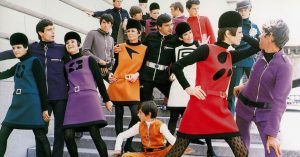
The innovative creations of fashion designer Pierre Cardin provide the focus of “House of Cardin,” a new documentary charting his storied career, available for online streaming. Photo courtesy of Utopia.
Considering Cardin’s numerous innovations, many would call him a visionary. He transformed fashion and consumer product design, and he reshaped these industries in ways that broke down conventional barriers. And those changes have proved to be more than just passing fads, persisting since their implementation. But just where did these revolutionary new ideas come from?
Imagination is the starting point of virtually any new conception. But they only come into being through the power of our beliefs, the building blocks of the conscious creation process, the philosophy that maintains we draw upon these resources in shaping the reality we experience. In Cardin’s case, he drew upon them constantly in taking his ideas out of the world of imagination and into the realm of manifestation. And, even if he had never heard of this philosophy, based on his track record, it’s obvious he’s a master of its principles, and he put that knowledge to work in myriad ways.
Unlike other designers, Cardin had a distinct advantage that helped drive his success. As noted previously, his tailoring skills set him apart by providing him with the knowledge of the workings of clothing design. Because of that, he had both the ability to envision and create new looks and the knowledge to understand how to make them work. And that dual nature of his skills stemmed from his expertise in developing beliefs that covered both areas, enabling him to produce inventive and workable designs.
Proficient conscious creators understand the power in that. They readily recognize that the ability to form beliefs for both devising new conceptions and developing the means to bring them into being is a powerful combination, one that’s crucial to success in the application of the philosophy in virtually any field of endeavor. Cardin set a powerful example in that regard, one that we could all learn from, no matter how we employ these principles in our lives.
Much of Cardin’s success is also attributable to his ability to see past convention and limitations. In an industry steeped in tradition and an established mindset, change came slowly, despite a reputation for intrinsic creativity. The influences that Cardin drew upon and subsequently incorporated into his work often came from outside the sources his peers used – modernism, color, geometric patterns, cross-cultural elements, and even the impact of burgeoning developments in science and technology. By thinking outside the box and tapping into these unlikely influences, Cardin created radically new and different fashions. Add to that his savvy marketing skills, which also pushed through existing barriers, and the industry suddenly had a bold new innovator in its midst.
But, perhaps more than anything else, there was Cardin’s sheer enjoyment of the creative process, something that’s still apparent in his life as it nears the century mark. The drive to continually manifest new creations is powerful – and empowering – a practice that helps to keep the mind of the nonagenarian vibrant and vital. And, in the process, its power benefits us all, too, providing us with an ongoing resource of inventive new designs, adding to our quality of life. If anyone ever doubts the benefits that creativity affords, one need only look to this example and see what it has done for both the creator and his beneficiaries.
This rare look into the life and career of this design visionary provides an insightful examination of how one man almost single-handedly changed an industry and its output. Directors P. David Ebersole and Todd Hughes have compiled an impressive array of archive footage and recent interviews with Cardin and his friends and peers, such as fellow designers Jean-Paul Gaultier, Hanae Mori and Philippe Starck; Vanity Fair contributor Amy Fine-Collins; artists who have benefitted from his support, including Jean-Michel Jarre and Alice Cooper; and actresses and models who have worn his designs, such as Naomi Campbell, Sharon Stone and Dionne Warwick. While the film has an occasional tendency toward worshiping its subject, its treatment is generally reverent, respectful of his accomplishments and careful to avoid delving too deeply into private matters that are truly no one’s business. This delightful documentary is an ideal choice for those who appreciate good design, no matter what form it comes in. The film is available for online streaming.
Some may find today’s preoccupation with designer labels shallow and banal, and a good argument could be made in favor of that notion. However, if we look past the logos, the tags and the embroidered stitching, it’s entirely possible to find some truly inspired inventiveness, especially when it comes to stylish new looks. Pierre Cardin has made tremendous contributions in this regard, and he helped to make them more accessible to a wider audience than his predecessors. That’s quite an accomplishment – and one that looks great, too.
Copyright © 2020, by Brent Marchant. All rights reserved.
The post ‘House of Cardin’ celebrates the joy of creativity appeared first on Brent Marchant.
October 10, 2020
‘Cicada’ chronicles the path to healing
“Cicada” (2020). Cast: Matthew Fifer, Sheldon D. Brown, Sandra Bauleo, Cobie Smulders, Jazmin Green Grimaldi, Scott Adsit, Michael Potts, David Burtka, Jason “Freckles” Greene, Beau Curran, Bowen Yang. Directors: Matthew Fifer and Kieran Mulcare. Screenplay: Matthew Fifer and Sheldon D. Brown. Web site. Trailer.
Healing old wounds can be a long and painful process, especially if we’re unclear about the nature or source of the hurt. When we are, though, the path to overcoming trauma can be a seemingly unending one in which the anguish never goes away, leaving us feeling as if there’s no hope for recovery or a future worth looking forward to. But, many times, and often quite unexpectedly, something happens that sets us off in a new direction, a development out of left field that works wonders, serving as a soothing balm for those emotional lacerations. So it is for a pair of injured souls in the profoundly moving new love story, “Cicada.”
The summer of 2013 has been a difficult one for Ben (Matthew Fifer). The twenty-something bisexual Gothamite is confused about his life. Something nebulous is eating away at him, but he’s not sure what. He escapes by plunging into drunken binges that usually lead to spontaneous sexual encounters with men and women, many of them virtual strangers. But those alleged pain-deadening escapades do little to soothe his distraught feelings, which have come to include both emotional and physical components. The same is true of his visits to see his mother, Debbie (Sandra Bauleo), and sister, Amber (Jazmin Green Grimaldi), at the Long Island home where he grew up; they provide little comfort and sometimes make things worse. In fact, the trilling of cicadas recently emerged from their 17-year underground hibernation cycle in his childhood backyard inexplicably seems to exacerbate his anxiety.
Ben’s state of mind is not lost on his friends, either, such as his emotional, empathetic New Age pal Hudson (Bowen Yang), and co-workers like Theresa (Jason “Freckles” Greene), a flamboyant colleague with whom he has a clandestine tryst. The same is true for Bo (David Burtka), one of the wealthy gay daddy types for whom Ben provides interior restoration work; Bo recognizes that something’s up with Ben, even though that doesn’t stop him from trying to make a play for the handsome young contractor, a gesture that quietly, but decidedly, creeps him out.
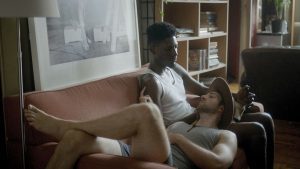
Partners Ben (Matthew Fifer, foreground) and Sam (Sheldon D. Brown, background) face a number of challenges in forging their budding relationship in the heartwarming and heart-wrenching new drama, “Cicada.” Photo courtesy of The Film Collaborative.
So how does Ben cope? For starters, he pays frequent visits to his physician, Dr. Dragone (Scott Adsit), who, after countless tests and examinations, constantly tries to reassure him that there’s nothing physically wrong with him, despite the patient’s assertions to the contrary. And, when the answers he seeks aren’t forthcoming, no matter what the source or situation, Ben tries to cover his feelings and deflect the inquiries of others by simply making jokes. His kindreds recognize what he’s doing, and, when they press him on this defense mechanism, he refuses to give them satisfaction by simply cracking more quips. He ends up walling himself off from others, except, of course, when sex or alcohol are involved, diversions that he continues to indulge in with gusto and little restraint. But, when Ben begins hearing recurring news reports about the trial and conviction of former Penn State assistant football coach Jerry Sandusky, a sexual predator accused of the serial abuse of underage boys, bells go off that make him more uncomfortable than ever.
Circumstances begin to change when Ben pays an impromptu visit to a bookstore, arguably more to cruise than to peruse the merchandise. He does find something he likes, though, when he strikes up a conversation with Sam (Sheldon D. Brown), a handsome fellow shopper. Their flirtatious exchange leads to a leisurely stroll and then to a number of subsequent meetings in which they discuss an array of subjects and enjoy one another’s company. There’s considerable chemistry between them, but their relationship is slow to turn physical as Sam reveals that he’s recovering from surgery, a procedure that has infringed upon his ability to engage in sex. Sam assures Ben that the situation is temporary, news that delights them both, since they’re clearly anxious to get busy.
Despite the steamy attraction between them, however, their current circumstances give them an opportunity to get to know one another. This allows Ben, for perhaps the first time in a while (if not ever), to develop a personal rapport with someone before jumping in the sack, something he truly seems to like. And, when the physical component of their relationship finally kicks in, he develops a genuinely strong bond with his new beau. Ben at least is on his way to forging a solid, committed, meaningful relationship.
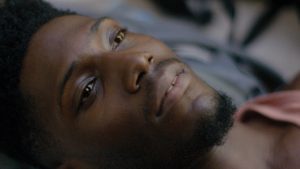
Sam (Sheldon D. Brown), a gay man struggling to emerge from the closet, wrestles with physical and emotional issues as he seeks to forge a new interracial relationship in writer-director Matthew Fifer’s debut feature, “Cicada.” Photo courtesy of The Film Collaborative.
However, as their bond evolves, it’s apparent that both partners are toting considerable baggage. Ben’s issues should be obvious, especially when he flashes back to his younger self (Beau Curran) and begins to get glimpses about what likely went on in his past. But Sam is troubled as well; he’s reluctant to step forward out of his self-imposed closet, largely because of his strict religious background and the dogmatic preaching of his pastor father, Francis (Michael Potts). Then there’s the mystery surrounding his surgery and the reason that prompted it, something Sam keeps under wraps, though clues emerge when he hears loud unexpected sounds, such as those associated with fireworks or cars backfiring.
On top of all this, there are the challenges associated with the nature of their relationship. As an interracial couple, they have periodic issues with analyzing and understanding the dynamics of what makes them work – or not work – as a pair, both personally and in a larger social context. It’s easy to see how these matters can arise and get blown out of proportion, a situation made worse by the respective traumas they’re each dealing with. To their credit, though, they work at it, because they believe the relationship is worth it. In the process, they not only address their joint issues, but also their individual problems. Ben begins attending counseling sessions with Sophie (Cobie Smulders), a kooky and unconventional but effective therapist. Meanwhile, Sam engages in a series of visits to his father to discuss his circumstances. And, in a tremendously courageous act, he finally confesses what caused the need for his surgery, a painful, heartbreaking incident that nearly cost him his life.
When faced with circumstances as trying as these, it’s hard for many of us to hold up. But, as Ben and Sam come to discover, they each have ample reserves of personal bravery to draw upon, something that’s readily bolstered by the considerable love and support that exists between them. That can prove invaluable to anyone undergoing such hardships, but it can be particularly crucial to individuals like Ben and Sam who are experiencing challenges on multiple fronts. It can help them heal and build a foundation for the future. And that’s heartening to see, especially when it comes to partners who obviously love each other as much as these two do.
But, as Ben and Sam work through these challenges, they must each ask themselves what they make of their circumstances – not an easy task considering what they’ve experienced and what they are now up against. One can’t help but wonder why anyone should have to suffer through such trials and traumas, not only for the harm they inflict, but also for the aftermath that results from them. That’s particularly important in terms of how these incidents affect their views of life and themselves. They shape their beliefs, which, in turn, provide the template for the reality they experience. This is the basis of the conscious creation process, the philosophy that maintains we draw upon the power of these metaphysical tools in manifesting our existence.

When faced with emotional issues that won’t go away, Ben (Matthew Fifer, right) consults Sophie (Cobie Smulders, left), a kooky, unconventional therapist, in “Cicada.” Photo courtesy of The Film Collaborative.
In a scenario like this, Ben and Sam must examine their thoughts, beliefs and intents to determine their views about themselves, both for their present and their future. To do that, though, they must take a hard look at what they believe about their pasts, for those beliefs have come to frame where they are at the moment and, potentially, where they could be headed down the road.
Of course, their reluctance to engage in such an exercise is understandable, considering what they’ve been through. But, if they hope to get past the hurts that come from such experiences, it’s the path they must follow. Confronting the experiences and the beliefs that have come out of them is thus crucial to get past them and move forward. Only then can they have realistic hopes for better days ahead.
A key aspect of this practice is rewriting the beliefs they hold about themselves. For Ben, for example, there appear to be beliefs associated with not being able to get past his troubles, in large part because he either can’t admit to them or, as time passes, can’t bring himself to confide them to others, even his soul mate. It’s as if he’s like one of those cicadas in his childhood backyard, hiding underground for much of his life to protect himself from those who would do him harm, a practice not unlike that of his insectoid counterparts. As for Sam, he’s dealing with constant shaming about the sins of homosexuality that played a key role in his fundamentalist religious upbringing, conditions that haven’t exactly been conducive to coming out of the closet and have subsequently prompted feelings that continually reinforce beliefs perpetuating that outlook.
Thankfully, these situations are far from unalterable. They can be changed, as can the beliefs supporting them. It may not be easy, and help may be required. However, Ben and Sam are fortunate to have been astute enough to draw means of assistance into their respective realities. Ben has Sophie’s guidance, for example, to help him work through his trauma. And both Ben and Sam have each other to lean on, their loving support available whenever needed.
Even though these endeavors may take some effort, the payoff is certainly worth it. If nothing else, it enables Ben and Sam to work through their fears and live heroically. Such a mindset can fill them with a sense of courage that allows them to be themselves and build the lives they want, free of apprehensions and the ghosts that have been chasing them for so long. That’s quite a dividend for changing one’s mind and resolutely deciding to rid themselves of notions that no longer serve them.

This heartwarming and heart-wrenching look at how to resolve past traumas is inspirational for those who find themselves suffering and without hope. It demonstrates how the power of love can help those in pain move through their hurts, regardless of one’s sexual orientation. Writer-actor-director Matthew Fifer’s fact-based love story, augmented with material provided by longtime friend and writing-acting collaborator Sheldon D. Brown, tells a touching tale that’s peppered with inventive and whimsical touches of comic relief and features an excellent ensemble cast. This film will touch viewers deeply, earning every single bit of empathy that it draws out of its audiences, making it easily one of the most endearing and honest love stories I’ve ever seen.
“Cicada” has primarily been playing at gay film festivals and thus may take some effort to find, but it is well worth the effort. I’d like to hope this offering gets a wider release, either in theaters or via streaming outlets. It’s truly that good.
Just when we may be ready to give up on our path to healing, a miracle can come along to help us convalesce. It may not seem like much at first, but, as it settles in and becomes an integral part of our life, we may soon see it begin to work its magic, taking away the hurt and showing us that there is a reason to look forward to tomorrow. Love often fills that role nicely, providing us with what we need just when we need it most. And, with any luck, we won’t have to wait 17 years to see the results.
Copyright © 2020, by Brent Marchant. All rights reserved.
The post ‘Cicada’ chronicles the path to healing appeared first on Brent Marchant.
October 7, 2020
Check out the Dudes!
Tune in for the latest edition of Bring Me 2 Life radio’s newest broadcast, Afternoons With The Dudes, now available by clicking here. Join host Selo Closson, yours truly and a great group of guys for an insightful discussion about how men can get better in touch with their feelings.

The post Check out the Dudes! appeared first on Brent Marchant.
Wrapping Up Reeling
Reeling 38, Chicago’s International LGBTQ+ Film Festival, recently completed its 2020 edition in its first-ever all-virtual format. With movie houses just now beginning to reopen due to the COVID-19 pandemic, this alternative approach made it possible for the festival to go forward, and it worked remarkably well, enabling viewers to screen a variety of films while remaining safe at home. In fact, in some ways, this is a viable approach well worth considering for future events, one that makes it possible to offer the festival’s films to a wider audience and providing flexible viewing conditions, benefits not necessarily available when presented in theatrical venues.

Because of this new format, I was able to screen a greater number of films than I have in the past. In total, I watched 18 feature offerings, most of which were above average to excellent. Below are my reviews of the releases I watched, some of which truly had me … reeling.
“Cicada” (U.S.) Score: 4.5/5 (****+)

A heart-wrenching look at how two gay male partners (Matthew Fifer, Sheldon D. Brown) in an interracial relationship work together at solving their respective past traumas and how the power of love can significantly aid and smooth the process. This fact-based dramatic love story, written and directed by protagonist Fifer, is peppered with inventive and whimsical touches of comic relief and featuring an excellent ensemble cast (especially Cobie Smulders as a kooky unconventional therapist) and moves viewers deeply, earning every single bit of empathy that it draws out of audiences. Easily one of the most endearing and honest love stories I’ve ever seen, sexual orientation aside. Don’t miss this one – my top pick from the festival.
“The Capote Tapes” (U.S./U.K.) Score: 4/5 (****)
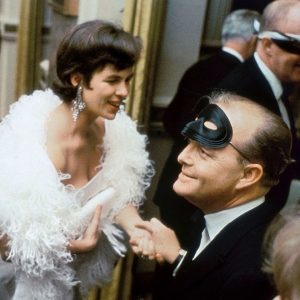
Flamboyant, openly gay author Truman Capote may not have been especially prolific, but he wrote several noteworthy, well-respected works. However, when excerpts of what was supposed to be his crowning achievement – the novel Answered Prayers about the dirty little secrets of New York high society based on the lives of a number of his “friends” – he became a pariah of sorts, losing contact with many of those close to him and triggering a speedy downward spiral in his health and well-being. In this new documentary, excerpts of recorded interviews with many of his friends and colleagues and new interviews with those who knew him and studied his work shed light on the enigmatic icon, his life and his writing, particularly with regard to his final and unfinished work. Included are archive segments featuring Lauren Bacall, Candice Bergen, George Plimpton, Norman Mailer, Lee Radziwill, Harper Lee, William F. Buckley and Capote’s partner Jack Dunphy, along with new conversations with author Jay McInerney, journalist Sally Quinn, Vogue editor André Leon Talley and talk show host Dick Cavett, among others. Director Ebs Burnough’s debut feature presents a captivating look at a talented, troubled and towering figure.
“Ema” (Chile) Score: 4/5 (****)
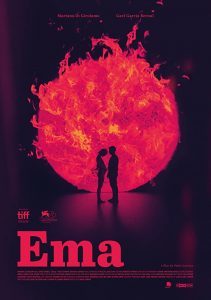
Acclaimed Chilean director Pablo Larraín’s latest offering explores the exploits of a free-spirited bisexual dancer (Mariana Di Girolamo) and the lengths she’ll go to in order to regain access to the troubled adopted son (Cristián Suárez) that she and her husband (Gael García Bernal) hastily gave up in the wake of the child’s bizarre antisocial behavior, a trait the youngster shares with his mother. Easily Larraín’s most experimental release, “Ema” is sometimes inscrutable yet always captivating, especially in its compelling dance and erotic sequences, a visually delightful, troubling and arousing palette. This one won’t suit everyone, but, for those who enjoy watching envelope-pushing cinema, this one will be right up your alley.
“Galore” (Netherlands) Score: 4/5 (****)

When plus-size Dutch drag queen Lady Galore (Sander den Baas) decides to undergo gastric bypass surgery to help improve the state of her health, she wonders whether the change in her body size and shape will affect how others have come to identify her. Will the persona she’s so carefully crafted disappear with the pounds she’s about to lose as a result of her procedure? Or will she be able to reinvent herself and maintain the level of visibility and popularity she’s already attained? This intimate documentary about her journey into a new life provides an intriguing look at a charismatic and caring individual who fights for dignity, self-respect and recognition for herself and her community, even through all the changes and challenges she undergoes. An inspiring and uplifting true life tale from directors Dylan and Lazlo Tonk.
“Give or Take” (U.S.) Score: 4/5 (****)
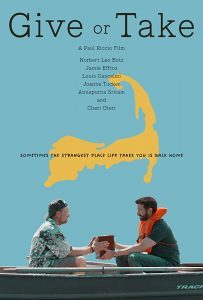
When the estranged adult son (Jamie Effros) of a deceased late-blooming gay man returns home to Cape Cod to settle his affairs and make provisions for his father’s surviving partner (Norbert Leo Butz), the trip raises issues of love, loss and self-reflection for all concerned in this sensitive tale of trauma, healing and forgiveness. While the film has a tendency to become occasionally repetitive in the second half, writer-director Paul Riccio’s debut feature treats its subject matter tenderly yet honestly and forces its characters to come to terms with who they are, for better or worse. A well-made effort for a small independent production that skillfully incorporates gay themes without dwelling on them or bombarding audiences with rhetoric.
“Single Street” (“Singel 39”) (Netherlands) Score: 4/5 (****)
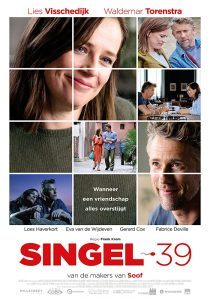
Though slightly formulaic in nature, this otherwise-delightful Dutch alternative rom-com from director Frank Krom tells the story of a lonely heart surgeon (Lies Visschedijk) who becomes best friends with her gay male neighbor (Waldemar Torenstra). As the two grow closer, it’s apparent that their friendship runs deep, but, when talk of making a baby enters the picture, matters grow complicated, especially when changes of heart enter the picture. This breezy, witty tale could have handled a few aspects differently, but it aptly shows that love need not always conform to conventional expectations, a message we could all stand to hear a little more often than we do.
“Tahara” (U.S.) Score: 4/5 (****)

When the unusual fusion of teen sex comedy meets coming out/coming of age tale meets Jewish humor, you’ve got director Olivia Peace’s debut feature, “Tahara,” a delightfully humorous spin on a tried-and-true formula long overdue for the infusion of fresh new influences. While the picture admittedly suffers from some occasional pacing problems (due to several overlong, overly talky scenes), the overall result is a laugh-out-loud funny romp that skewers taboo material and the film’s source genre on a variety of fronts in a variety of ways. The picture’s inventive use of animation and claymation and excellent ensemble cast (especially protagonists Madeline Grey DeFreece and Rachel Sennott) add further charm and whimsy to an already-clever narrative, making for an enjoyable time at the show. Fun, fun, fun!
“Cocoon” (“Kokon”) (Germany) Score: 3.5/5 (***+)
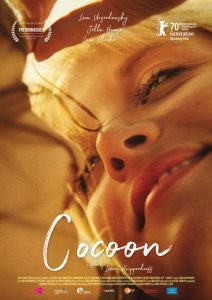
When a shy, nerdy Berlin teen (Lena Urzendowsky) who breeds caterpillars as a hobby begins to discover her budding lesbian identity, she starts to blossom like the butterflies who are morphing inside their cocoons. While the film has a tendency to meander in spots, the picture’s overall story and script are largely spot-on, rich in nuance, symbolism and subtle humor, all the while taking the narrative in some pleasantly unexpected directions. A tauter screenplay would have allowed this one to truly shine, but, as it is, it takes flight pretty well enough on its own. A soaring sophomore effort from director Leonie Krippendorff.
“Goodbye Mother” (“Thua Me Con Di”) (Vietnam) Score: 3.5/5 (***+)
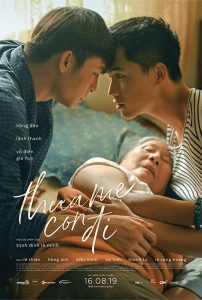
This tender comedy-drama-love story about a Vietnamese emigre-turned-U.S. citizen (Lanh Thanh) who returns home for a family ceremony with his gay lover (Vo Dien Gia Huy) in tow touches on all the right themes when it comes to the challenges of coming out in a culture strongly resistant to the idea. Many sweet moments, many bittersweet moments and a number of unexpected surprises give shade and coloring to this sometimes-awkward, sometimes-uncomfortable, often-humorous tale. Admittedly there are a few too many secondary story threads running through the narrative that tend to bog down the flow (especially in the final act), but, in general, director Trinh Dinh Le Minh’s sophomore effort is a touching, warm-hearted offering about love, romance, togetherness and the things that both lift them up and weigh them down.
“Dramarama” (U.S.) Score: 3/5 (***)

When a closeted gay teen (Nick Pugliese) contemplates coming out at a farewell party for his drama club high school classmates (Anna Grace Barlow, Nico Greetham, Megan Suri, Danielle Kay) as they leave for college in 1994, the evening turns into a free-for-all of emotions, both good and bad, for the entire group. While the exchanges do have their wickedly funny moments, the laughs are a little too few and far between (and sometimes a little too forced) to make this story work, especially when the conversations get bogged down by sniping, petty squabbles, and heavy emotional (and, sometimes strangely enough, religious) discussions. The supreme eloquence of the teenage cast members also seems a bit incongruous for their characters, as they speak with an articulation, erudition and wit that seem well beyond their years, especially in light of the naïvete that also emerges. And, as for that coming out issue, what seems like it’s going to be the central thrust of the narrative is all too often relegated to the back burner, reconciled to almost-superfluous secondary treatment. In short, director Jonathan Wysocki’s debut feature comes across like a well-intentioned, pleasantly nostalgic, autobiographical stroll down memory lane, but it’s one that’s probably a little too “inside” to be fully understood and appreciated. Nice try, but no awards here.
“No Hard Feelings” (“Futur Drei”) (Germany) Score: 2.5/5 (**+)
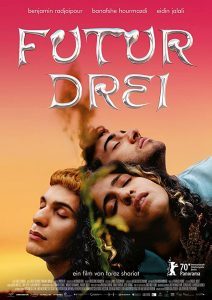
When a German-born son of Iranian immigrants (Benny Radjaipour) befriends a refugee brother (Eidin Jalali) and sister (Banafshe Hourmazdi) from his family’s homeland, a tentative but passionate romance develops between the two young men in the face of an uncertain future. This tale of love, acceptance, fitting in and finding oneself has its insightful moments of tenderness, emerging wisdom and righteous empowerment on multiple fronts. Unfortunately, uneven pacing, the use of experimental montages that don’t always work, and a variety of story elements that, regrettably, lose something in translation or end up superfluous intrude upon the aspects of the film that do work, creating an uneven mix overall. It’s intriguing to see a story that attempts to deal with a segment of society that has largely gone overlooked; it’s just a shame that director Faraz Shariat’s debut feature didn’t handle it better than it did.
“The Strong Ones” (“Los Fuertes”) (Chile) Score: 2.5/5 (**+)
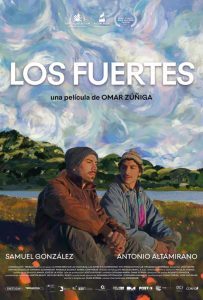
While it may provide little-known insights into an unfamiliar culture and footage of a venue that’s not a readily recognizable film setting, this Chilean gay male romance features a narrative that’s about as trite and predictable as they come. The “forbidden love affair that can’t last” has been done so many times over the past four decades that it’s become tired and clichéd at this point. Even if this offering represents groundbreaking material by Chilean cinema standards, the story follows this formula to the letter so faithfully that there’s virtually nothing in it that one doesn’t see coming from a mile away. In fact, the most interesting aspects of the film lie in its secondary stories, its gorgeous cinematography and its symbolic (though underused) thematic visual allusions. Gay cinema has taken its time getting beyond stories as familiar and well worn as this, and releases like this from director Omar Zúñiga Hidalgo unfortunately tend to bog down the progress the genre has made in striking out in new directions. This one, instead, just strikes out.
“Drawn Back Home” (U.S.) Score: 2/5 (**)

When a thirty-something gay man (Paul Michael Thomson) returns to the small town that he fled because of his parents’ intolerance, he reunites with his long-lost best friend (Mickey O’Sullivan) for a reunion that carries deeper ramifications, leaving him with a big decision about his future. While the “home is where the heart is” narrative is indeed sweet and touching, its execution here is undermined by wooden acting, stilted writing, inconsistent character development, clichéd editing, occasionally laughable cinematography and a stunningly preposterous lack of chemistry between the protagonists. The heart of director Thomas Awrey’s debut feature may be in the right place, but that sentiment is so badly overshadowed by all of the film’s other problems that it’s not allowed to shine as well as it otherwise might have. Salvaging this offering may have been possible, but only with a sorely needed script rewrite, better casting and an overhaul of the production logistics. A missed opportunity, for sure.
“A Skeleton in the Closet” (“Todos tenemos un muerto en el placard o un hijo en el closet”) (Argentina) Score: 2/5 (**)

As the title implies, there’s definitely a closet here, but what exactly constitutes the skeleton inside it leaves much to the imagination (and, if it’s what I think it is, it doesn’t send a terribly empowering or affirming message, either). Director Nicolás Teté’s domestic drama about a twenty-something gay man (Facundo Gambandé) trying to find himself when he pays a visit to his overly polite family in his small but less-than-open-minded hometown after years in Buenos Aires is all over the map with a variety of story threads, many of them linked with pointless filler that serves as little more than padding or bridges between segments. The characters aren’t especially interesting, nor are their rather predictable, clichéd dilemmas. Add to that a truly annoying background score that sounds like something out of a made-for-cable TV movie, and you’ve got a mix that makes one want for an ending (and the one viewers get isn’t especially satisfying, either). Next…
“Stone | Fruit” (U.S.) Score: 2/5 (**)
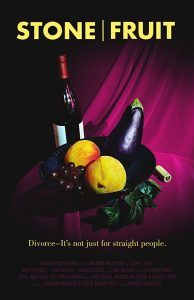
There’s witty repartee and then there’s unnatural banter, and, when it comes to this comedy-drama about a divorcing gay male couple (Rob Warner, Matt Palazzolo) spending one last weekend together to achieve closure about their decision, it’s definitely a grandiloquent exercise of the latter. This failed attempt at saying something meaningful about the ending of a relationship tries way too hard, with over-the-top dialogue that’s so pretentiously overwritten that it’s genuinely difficult to sit through the opening hour. Admittedly, writer-director Brandon Krajewski’s debut feature gets better further into the story, but it’s not enough to save this slog, even if you’re able to make it that far into the film. What ultimately plays like an evening with the queens matching wits at a gay bar doesn’t do this subject justice, and that’s an even bigger shame than the painful decision faced by the picture’s two parting protagonists.
“Are We Lost Forever” (Sweden) Score: 1.5/5 (*+)
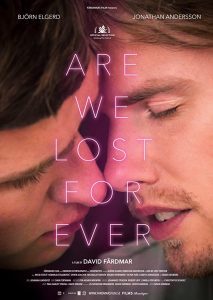
Director David Färdmar’s tedious, whiny slog through the breakup of a gay male couple’s on-again/off-again, on-again/off-again, on-again/off-again relationship and what happens when each partner (Jonathan Andersson, Björn Elgerd) meets someone new tries the patience of even the most earnest moviegoer. The film’s often-circular script, protracted shots of oh-so-sincere emoting, occasionally ridiculous dialogue and a positively detestable protagonist make viewers long for the ending that seems forever in coming. Indeed, just because breakups can be painful, that doesn’t mean we must have a ringside seat to watch every exhausting moment of the action unfold. Pick another movie instead.
“Family Members” (“Los miembros de la familia”) (Argentina) Score: 1/5 (*)
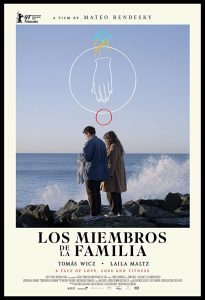
Despite some modestly interesting characters and occasionally intriguing ideas, director Mateo Bendesky’s rambling, minimalist, surreal drama-comedy (a term I’d use very loosely) never (and I do mean never) finds any meaningful traction. While billed as a coming of age/coming out tale with a metaphysical twist (dressed up in a largely snide, smarmy package), this utterly strange, totally directionless mess ambles along toward a hoped-for payoff that’s never reached. Don’t waste your time.
“Luz” (U.S.) Score: 1/5 (*)

What begins as a cellmate friendship turns into a prison romance in which the separated partners (Ernesto Reyes, Jesse Tayeh) must cope with their circumstances when paroled at different times, a situation that becomes further complicated once both are in the outside world again. Unfortunately, despite this mildly intriguing premise, director Jon Garcia’s overlong offering gets bogged down in subplots that are never fully developed and/or descend into the depths of predictability. I couldn’t wait for this one to end and to see what neat, tidy wrap-up it would employ before the credits rolled (something my eyes were already doing throughout much of the film’s second half).
Copyright © 2020, by Brent Marchant. All rights reserved.
The post Wrapping Up Reeling appeared first on Brent Marchant.
September 25, 2020
‘Blackbird’ wrestles with matters of life and death
“Blackbird” (2019 production, 2020 release). Cast: Susan Sarandon, Sam Neill, Kate Winslet, Mia Wasikowska, Rainn Wilson, Lindsay Duncan, Bex Taylor-Klaus, Anson Boon. Director: Roger Michell. Screenplay: Christian Torpe. Web site. Trailer.
We’re all aware that our lifetimes are finite in nature and that they will one day come to an end. But, as our lives unfold, many of us become progressively more concerned with how that end will ultimately come about. Will it be on terms of our own choosing? Or will we relegated to circumstances that are out of our control? And how much input will we have in determining the details of the process? Those are among the questions raised in the moving new end of life drama, “Blackbird.”
Life for aging ALS patient Lily (Susan Sarandon) has become a shadow of what it once was. The fiercely independent free spirit, who could easily be the poster child for the causes of choice and free will, has led a rich, remarkable, experience-filled life on her terms. However, with the advance of her illness and failing physical state, she’s seen that existence shrink considerably. She’s lost the use of an arm, her breathing has become labored and her sense of balance has grown precarious. She still insists on being as self-sufficient as possible, often refusing help from others, like her dutifully patient, ever-well-meaning physician husband, Paul (Sam Neill). But, even with such strong-willed determination, Lily sees the writing on the wall and realizes that she’s only weeks away from being confined to a network of life-sustaining equipment that, in her view, will only prolong her suffering. For someone with her temperament, that’s worse than a death sentence.
With such a clear awareness of her circumstances, Lily decides to take action. She’s determined to bring matters to a conclusion on her terms, no matter what others may think or what the law may say. She thus sets plans in motion to make her exit in the way she wishes to leave.

In essence, Lily plans a celebration of life for herself and her family. She summons her nearest and dearest to her Connecticut seashore home over Thanksgiving weekend for what she wants to be a loving, fun-filled gathering that marks one last time for sharing long-standing traditions, heartfelt sentiments and joyful good times. And, at the conclusion of that time together, having said her goodbyes and with Paul’s assistance, she plans to quietly slip away, letting go of her pain and courageously moving on to whatever grand adventure awaits her next.
Lily sees the weekend as a time of great expectations. Yet, despite the best laid plans, it also has the potential for emotionally charged upset and debates about the wisdom of her decision, despite agreements made in advance to keep the mood positive and prevent those issues from arising. Nevertheless, considering what’s at stake and what’s about to transpire – a weepy and trying time fraught with possible legal consequences – there’s a good chance that Lily’s plans may not unfold as hoped for. Add to that the revelation of long-hidden secrets and previously unexpressed emotions, and you’ve got a volatile mix that the well-intentioned patient may not want – and that she may have never seen coming.
Gathering for the weekend are those who have long been in Lily’s life: her elder daughter, Jennifer (Kate Winslet), a privileged, uptight perfectionist who always wants to do the right thing and mercilessly insists that others do the same; her flighty, ungrounded younger daughter, Anna (Mia Wasikowska), whose mysterious disappearances and erratic behavior always keep the family guessing; Jennifer’s husband, Michael (Rainn Wilson), an impish, playful sort who tries to deflect conflict but ultimately has difficulty keeping a lid on his frustration; Anna’s on-again/off-again lesbian partner, Chris (Bex Taylor-Klaus), an old soul in a young body who frequently provides much-needed wisdom in the midst of chaos; Lily’s teenage grandson, Jonathan (Anson Boon), a chip off his free-spirited grandmother’s shoulder; and Lily’s oldest friend from college, Liz (Lindsay Duncan), a kindred spirit who has been with her through all the good times and remains fiercely loyal even in the face of death.
Over the course of the weekend, Lily has an opportunity to spend time with each of those in attendance, saying what’s gone unsaid and seeking to wind up any remaining unfinished business. The attendees also have an opportunity to share time with one another, expressing their feelings and having a chance to address outstanding issues. It’s a time for being spontaneous and uninhibited, such as celebrating an early Christmas, something that Lily realizes she’d be in no shape to properly enjoy if she chose to postpone her self-inflicted demise for a month. And it’s also a time to wax philosophically about issues like taking chances, breaking rules, exercising one’s power of choice, and knowing when to hold on – and to let go.
It’s an experience that proves remarkably rewarding, devastatingly difficult and curatively purging, all at the same time. It gives everyone an opportunity to take away from it exactly what he or she needs. And it’s something that ultimately will touch everyone in ways never thought possible. But, then, none of that would have happened were it not for their willingness to exercise their powers of choice and free will, and isn’t that what life is ultimately all about?
As I have written on a number of occasions, choice and free will are among our most precious birthrights, and we should make every effort to value them, using them judiciously in the ways we lead our lives. However, all too often, we disavow these attributes, claiming that we’re unable to exercise them or, even worse, contending that they don’t even exist. Such practices significantly diminish our lives, leading to existences that are unfulfilling and full of regrets, truly sad outcomes to be sure. Which is why the example Lily sets is so valuable, showing us the importance of our capacities for choice and free will in our lives, even in matters as weighty as how we die.
How we make use of these aspects of our lives depends greatly on our thoughts, beliefs and intents, the cornerstones of the conscious creation process, the philosophy that maintains we draw upon the power of these metaphysical tools in shaping the reality we experience. They drive what happens, framing the nature of our existence and everything within it. And, if we want that experience to be all it can, we had better be careful how we wield that power. Do we want a life that consists of what fulfills us? Or do we capitulate to the dictates of convention, even if it’s not what we want, simply because we’ve allowed ourselves to believe we have no choice in the matter?
Lily has lived her life under the assumption that she’s in the driver’s seat. She has long decided what she wanted. She has followed her heart, even if it’s not the path that others would take or whether they would approve of them. In fact, she’s not about to let trifles like the law dictate how she lives her life – or leaves it behind. To do otherwise in any of these contexts would go against her very nature, her true, authentic self. And she’s not about to stop now, even as her journey approaches its end. As she comes upon what is perhaps the most important event of her life, she’s patently unwilling to go through it on terms that don’t suit her.
As Lily reflects back on her life over the weekend, she reminisces about the many vivid, colorful experiences she’s had during her time on the earthly plane. She speaks fondly of the chances she took, unafraid to bend or break the rules to provide herself with the satisfaction she sought. She relishes her sexual adventures, her enjoyment of art and music, her drug experiences, her times as a wife and mother, and much, much more. Together those elements have woven a rich tapestry of experience, one characterized by experimentation, fulfillment and a willingness to courageously dismiss her fears. This combination has made for a truly heroic journey, one that we should all seek for ourselves during the time we’ve got.
Lily hopes that her decision to stage this final farewell will not only bring her what she wants, but that it will also set an example for those closest to her. She sees it as an opportunity to celebrate the life she has led, an experience she hopes others can appreciate and adopt for themselves to add more joy to their lives. She looks at her daughter Jennifer, for instance, and sees someone who has everything going for her but doesn’t enjoy it because of her neurotic demeanor. Moreover, she’s concerned that Jennifer’s constant worrying and niggling attitude are diminishing her quality of life, an outlook that Lily fears could be rubbing off on her grandson, filling his head with foolish notions and pointless preoccupations at a highly impressionable time in his life. Consequently, Lily doesn’t hesitate to make her opinions known on these fronts, hoping that they’ll have an impact in reshaping the beliefs that Jennifer and Jonathan hold. This becomes pointedly (and hilariously) apparent during the family’s impromptu Christmas gift exchange in which Lily gives each of them presents that poignantly reflect her views, hoping that they’ll make her viewpoint more than abundantly clear.
Of course, if we truly want such a satisfying life for ourselves, we need to discern what makes it worth living and what doesn’t. And, to that end, we need to be able to determine what’s worth keeping and what to release, particularly when it comes to what no longer serves us, even if that means our very physical existence. Lily has a keen sense about this, and, when she comes to realize that her failing physical state is preventing her from living the life she wants, she knows what she needs to do. With no likely prospect of recovery in her future, she consciously decides to avoid the probability that seems unavoidable. She thus embraces beliefs that make such an outcome possible and will subsequently bring it into being.
Despite good intentions and seemingly clear foresight, however, that doesn’t mean everyone involved in this co-creation will whole-heartedly share Lily’s aims. After all, those attending the farewell weekend are about to lose their beloved wife, mother and friend. As supportive as they might want to be, there’s still a sense of hesitancy lingering in their thoughts and beliefs. Can they really go along with Lily’s plan, no matter how much they love her? And, even if they fundamentally disagree with her decision, can they keep up a sufficiently credible front to reassure her otherwise?
Nevertheless, as difficult as all of the foregoing may seem, and even with a vague awareness of others’ doubts, Lily is determined to push ahead. She knows the time has come. But, even with that knowledge, over the course of what’s to be her final holiday celebration, she wants to remain committed to living in the now, fully engaged in the moment and all it has to offer. And that’s wise advice for all of us, especially in light of how preoccupied so many of us are when it comes to the way we live our lives, overly concerned with a past that’s come and gone or a future that has yet to arrive. Lily wants to immerse herself in the warmth and love around her at the time, while simultaneously expressing gratitude for what she has and having no regrets for what she doesn’t. With the end nearing and the time remaining to enjoy her life running out, she wants to make the most of every moment left while she still has the chance, an enviable example to follow.
The right to die is one of those topics that tends to divide society along rigidly defined lives, and that’s very likely going to be the case with a film like “Blackbird.” Director Roger Michell’s touching, thought-provoking, deeply moving drama, an American remake of the Danish offering “Silent Heart” (“Stille hjerte”) (2014), examines the dynamics within a family wrestling with this notion while honestly and lovingly addressing the heartfelt feelings associated with such a profound and intentional choice. While a few story elements don’t work quite as well as they probably could have, most of the narrative is handled sensitively and realistically, all brought to life by the superb performances of its stellar ensemble, particularly Sarandon, Neill, Wasikowska and Duncan. This release will obviously disturb some viewers, but others will be deeply moved – and fervently reminded that what we do with our lives (especially in the now) is up to us and no one else’s business. The film is available for online streaming and in limited theatrical release.
It should be noted that “Blackbird” has been the victim of some unfair criticism, that it’s yet another manipulative movie about a dying protagonist, an admittedly overworked cinematic theme. However, characterizing “Blackbird” as a picture about a dying protagonist oversimplifies what it’s seeking to address. It’s not a story about a character dying but about a character’s right to die, a topic that needs to be examined and debated much more fully than it has been. With the exception of a few films like “Whose Life Is It Anyway?” (1981) and the made-for-cable offering “You Don’t Know Jack” (2010), the right to die has been something of a taboo subject. But, as we should all be aware, death is indeed part of life, and how we approach it shouldn’t be a subject that’s hushed up or only spoken about in whispers in dark corners. We should all have the right to determine the conditions of our departure if we choose to do so, and pictures like this help to draw the subject into sharp focus. They should be applauded for their candor and forthrightness in helping to make it possible for us to move on to our own next grand adventures in the ways we seek.
As we approach death, a time when we often find ourselves at our most vulnerable, we may well feel disempowered and lacking in self-worth. Those conditions are bad enough in themselves, but, when we add to that indignities that magnify the state we’re in, we might feel even more despairing, compounding the woeful circumstances we’re already experiencing. Is that how we really want to spend our last days? Or do we want to create conditions that will uplift us and allow us to make peace with ourselves during such a trying time? Achieving such an outcome may push us to take charge of the situation, forcing us to be strong and resolute at a time when doing so could be fundamentally difficult. But, if that’s the price we must pay, then we must steel our resolve to realize the fulfillment we seek, no matter what others may think. It’s our life that’s at stake, and we have a fundamental right to live it the way we desire, even (indeed especially) in its precious final moments.
Copyright © 2020, by Brent Marchant. All rights reserved.
The post ‘Blackbird’ wrestles with matters of life and death appeared first on Brent Marchant.



